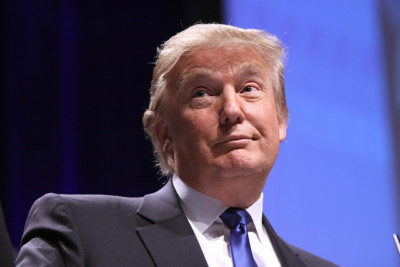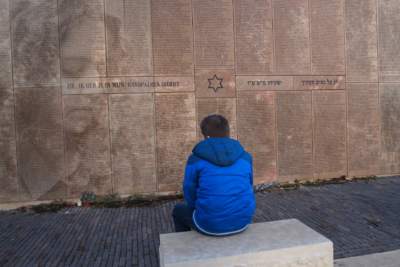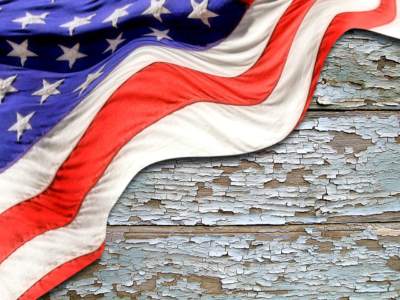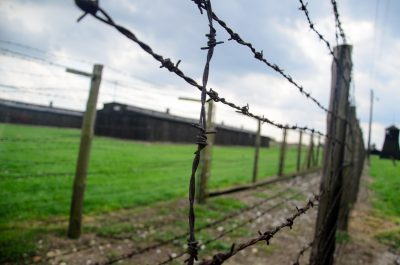The bar for President Trump is now set so low that he can clear it just by admitting that the Holocaust and anti-Semitism are bad.
Praising Trump’s April 25 keynote speech at the U.S. Holocaust Memorial Museum’s annual Day of Remembrance, Anti-Defamation League CEO Jonathan Greenblatt said, “It deeply matters that President Trump used the power of his office to stand against anti-Semitism and hate and to honor the memory of the six million Jews and millions of others murdered in Europe.”
Yet, from the perspective of groups like the ADL, the speech dispelled many of these concerns. Trump, in a professional-sounding speech, pointed out indisputably that the Jews were the Holocaust’s primary targets and pledged to stand with the Jewish people and root out anti-Semitism today. Greenblatt wasn’t the only one impressed; a Vox article said Trump “hit all the right notes” and that he had at last “begun sounding like his predecessors.”
But others, like Rabbi Jill Zimmerman, pointed out that Trump still did not apologize for any of his destructive rhetoric or policies, and one speech is not enough to remedy that.
So, who’s right? Did Trump deliver an impeccable speech, or were his words hollow given his previous actions?
The answer depends on your perspective on America’s approach to the Holocaust itself – as well as its approach to history in general – and the purpose of Holocaust memorialization.
In America, we alternate between pressing our nose up to the glass of history and burying its details in the dirt. There are the stories we want to tell: the Montgomery bus boycott, Lincoln signing the emancipation proclamation, the triumphs of the New Deal. And there are the others we’d rather not discuss or learn: how Federal Housing Administration loan discrimination paved the way for a century of devastating urban segregation, how our own federal government stalked and harassed our Civil Rights Movement hero Martin Luther King Jr., and so on.
Generally, the American imagination likes a vision of history that suggests we’re on the right track, that we’ve left evils like racism behind, that we’re progressing ever closer to a just society. It’s harder to process details of history that reminds us how we’re still tangled in injustice or how imperfect our heroes are, or how our founding documents spoke the language of freedom while supporting a system of bondage.
America doesn’t shy away from retelling the Holocaust. I learned about the Holocaust multiple times in dedicated units in both Hebrew school and public school. I toured the U.S. Holocaust Memorial Museum with my peers on an eighth grade school-wide trip and visited the Detroit Holocaust Memorial Center with my Hebrew school class.
One reason is that, unlike slavery or the Native American genocide, the Holocaust can be discussed in a way that affirms America’s dedication to its founding ideals. The Holocaust didn’t take place here. “We,” as Americans, were not the bad guys. Americans were eventually the camps’ liberators.
A primary example is the founding of the U.S. Holocaust Memorial Museum. It was born out of recommendations from a President’s commission on the Holocaust, convened by Jimmy Carter and chaired by Elie Weisel. While the commission’s 1979 report did acknowledge America’s complicity in the tragedy, lamenting how the U.S. should have “opened our gates more widely, protested more forcefully,” museum advocates defended the need for a Holocaust museum by appealing to a vision of American goodness.
According to Jewish studies scholar James E. Young, the U.S. Holocaust Memorial Council argued, “This Museum belongs at the center of American life because as a democratic civilization America is the enemy of racism and its ultimate expression, genocide.”[1] Much of American history directly contradicts that statement; any memorial to slavery would immediately challenge the idea that “America is the enemy of racism.” But a Holocaust museum could admit the United States’ missteps while still painting American society as the moral opposite of Nazism.
In addition to considering what the Holocaust means for America, the president’s commission considered how to both honor the specifics of the Holocaust, and its Jewish (and non-Jewish) victims, and give it universal relevance. The Commission argued that it was possible to do both: “The universality of the Holocaust lies in its uniqueness: the Event is essentially Jewish, yet its interpretation is universal.”
These contradictions have come to a head during the Trump era, creating conflicts over using the Holocaust as a rhetoric tool. For example, Bend the Arc, a progressive Jewish group, ran a well-publicized campaign called “We’ve Seen This Before,” highlighting the similarities between Trump’s political goals, like a ban on Muslim immigrants, and the lead-up to the Holocaust. Yet, not long ago, a Bay Area high school teacher and Holocaust expert drew similar comparisons during one of his history classes and was promptly forced to take temporary administrative leave.
So, then what are we to do with the memory of the Holocaust? Leave it alone and think of it as a unique embodiment of historical evil that, thank goodness, wasn’t perpetuated by America and will hopefully never happen again? Or are we to learn from it to recognize the warning signs of fascism and genocide and to more vigorously attack bigotry and hate at home? If the former, why are we herding thousands of schoolchildren throughout Holocaust memorials each year? If the latter, why haven’t we learned the Holocaust’s lessons already? Why have we elected a leader who tried to ban refugees of a certain faith from entering the country?
If you ask me, we should honor the memory of the Holocaust by trying to prevent it from ever happening to anyone again. If my Eastern European great-grandparents were not accepted as immigrants to America in the early twentieth century – some of them living undocumented for a time – there’s a good chance that I would not exist today. Last spring, I stood at the Holocaust memorial in Berlin, staring at pictures of Jews being evacuated from Lodz, Poland, the city that my dad’s family had left a few decades before. My family history is a potent reminder of the importance of granting safety to those who need it.
My family was lucky, arriving during the wave of European Jewish immigration before the U.S. limited immigrants from “undesirable” groups through a quota system. The U.S. continued to tighten immigration restrictions in the early 1940s, even as Jewish refugees looked for shelter from Nazism. Other Jews were not given a chance to survive.
But Trump didn’t mention that history in his speech. Instead, his words invoked the image of Americans as saviors: “We remember those first hopeful moments of liberation, when at long last the American soldiers arrived in camps and cities throughout occupied Europe, waving the same beautiful flags before us today, speaking those three glorious words: ‘You are free.’”
Praising Trump for his Day of Remembrance speech is moving the goalposts. A standard speech about the Holocaust only seems noteworthy because his administration has previously misappropriated the Holocaust and underestimated anti-Semitism. An American president properly acknowledging the Holocaust is not a radical or especially praiseworthy stance – and should not be treated as one just because Trump has previously struggled to condemn anti-Semitism with the full force it deserves. We should focus on the fact that Trump still has yet to show that he has reflected on the horrors of the Holocaust or learned anything from its history.
What Trump did on the Day of Remembrance was the bare minimum. And it was consistent with the American approach to history, in which we protect our self-image by distancing ourselves from the horrors of the past, without taking the opportunity to wrestle with their implications. If Trump truly cared about the Day of Remembrance – if he cared about standing against the loss of innocent life, against baseless hatred, against authoritarianism – there are plenty of ways he could show it. He could welcome with open arms the refugees, asylum seekers, and immigrants seeking safety on America’s shores. He could apologize for his words that have dehumanized and scapegoated Muslim, Mexican, and Black people. He could fire Steve Bannon. Unless he does, I’m saving my praise.
Mari Cohen is a journalist, poet, and fourth-year history major at the University of Chicago.
[1] “America’s Holocaust: Memory and the Politics of Identity,” by James E. Young, 73.
![25475724870_9fe3aeb6ee_z Donald Trump speaking at CPAC 2011 in Washington, D.C. | By Gage Skidmore [CC BY 2.0], via Creative Commons](https://newvoices.org/wp-content/uploads/2016/10/25475724870_9fe3aeb6ee_z.jpg)




